Tuesday,October 31, 2023. Annette’s News Roundup.
I think the Roundup makes people feel not so alone.
To read an article excerpted in this Roundup, click on its blue title. Each “blue” article is hyperlinked so you can read the whole article.
Please feel free to share.
Invite at least one other person to subscribe today! https://buttondown.email/AnnettesNewsRoundup
—————————————————————-
Joe is always busy.
“His strike” is over.
The settlement will make America a little fairer.
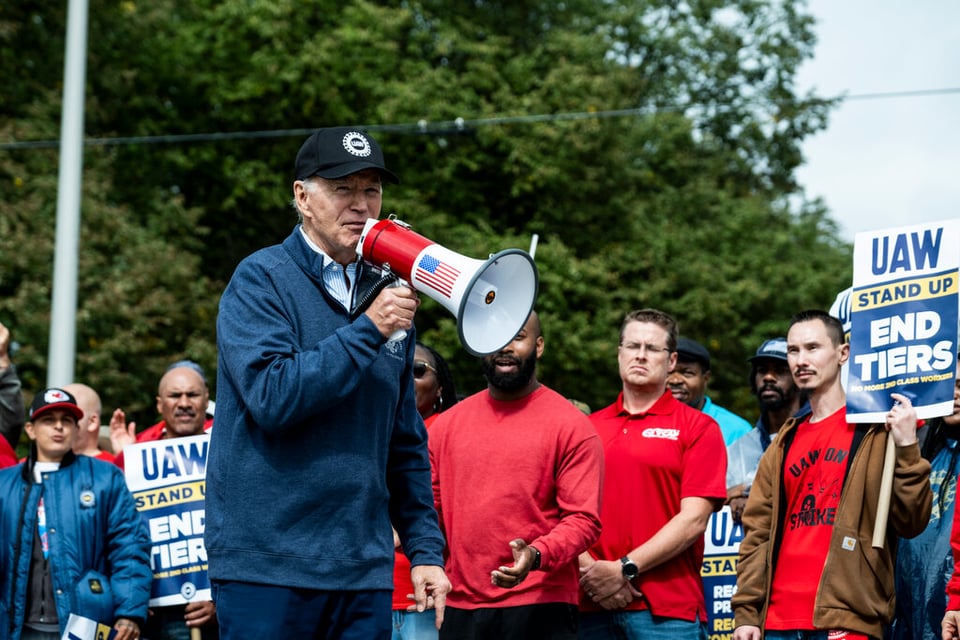
President Biden with U.A.W. picketers last month, a first for a sitting president.
Autoworkers Score Big Wins in New Contracts With Carmakers.
Tentative accords at Ford Motor, General Motors and Stellantis are the most generous in decades, raising costs as the industry shifts to electric vehicles.
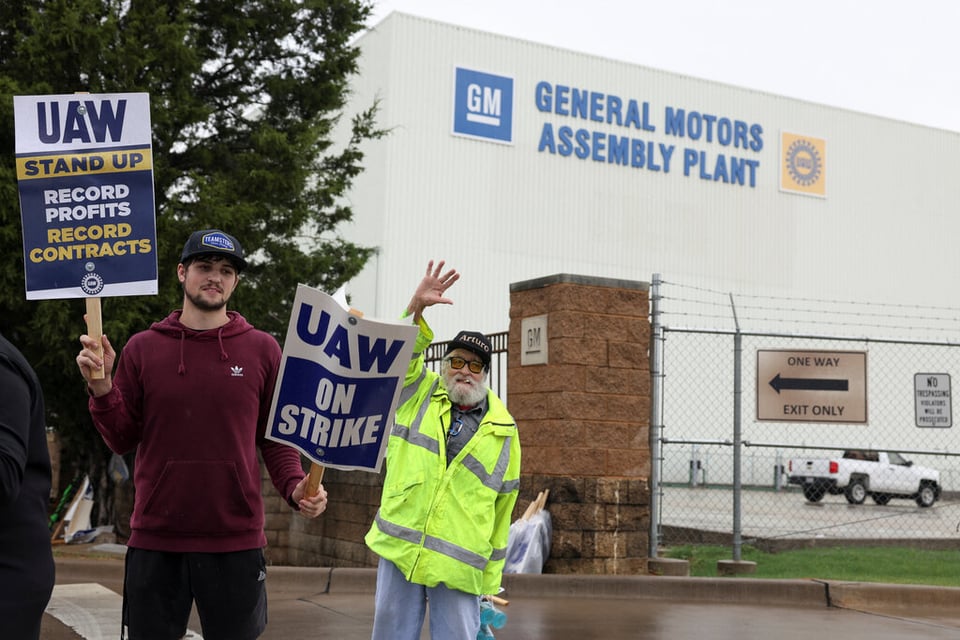
A six-week wave of strikes that hobbled the three largest U.S. automakers has put workers on track for new contracts — the third deal, with General Motors, was firming up on Monday — that will deliver the biggest pay raise workers will receive in decades while avoiding a protracted work stoppage that could have damaged the economy.
The separate but similar deals that the United Automobile Workers union reached in recent days with Ford Motor, G.M. and Stellantis, the maker of Ram, Jeep and Chrysler, will be costly for the automakers as they undertake a switch to electric vehicles. The deals could also set the stage for labor strife and demand for higher pay at nonunion automakers like Tesla and Toyota.
The tentative agreements, which must still be ratified by union members, also appeared to be a win for President Biden, who had risked political capital by picketing with striking workers at a G.M. facility in Michigan last month.
“I think it’s great,” [said] the president as he boarded Air Force One Monday morning, shortly after word arrived that G.M. appeared to have followed Ford and Stellantis in reaching a deal with the union.
The strike stretched longer than White House officials would have liked, but it appears to have been resolved before causing significant shortages of new cars and trucks that might have frustrated voters already angry about inflation.
“The near-term impact of this strike will be relatively minor,” said Karl Brauer, executive analyst at iSeeCars.com, an online auto sales site.
But Mr. Brauer warned that, in the long term, Ford, G.M. and Stellantis will have to raise car prices to remain profitable. Their competitors will follow suit to take advantage of the opportunity to earn higher profit margins, he said. “This is going to make cars more expensive,” Mr. Brauer said.
Potentially the most far-reaching effect of the strike could be on manufacturing workers not represented by the U.A.W. The contracts the union negotiated are the latest in a series of prominent victories for organized labor, including Hollywood writers, UPS workers and even some university employees.
Shawn Fain, the president of the U.A.W., portrayed the tentative agreements as a signal for the union to begin organizing drives at Tesla, which dominates the fast-growing electric car business, and foreign-owned companies like Toyota, Honda or BMW that have large U.S. operations. The union will “organize like we’ve never organized before,” Mr. Fain said Sunday.
Companies without unions can expect the U.A.W. to deploy the same hardball tactics that Mr. Fain used against Ford, G.M., and Stellantis, including rhetorical attacks on the multimillion-dollar executive pay and hourly wages that have failed to keep pace with high inflation.
Even if those union campaigns fail, as they often have in the past, they may prompt some employers to pre-emptively give workers raises.
Our business reporters. Times journalists are not allowed to have any direct financial stake in companies they cover.
Ford agreed on a tentative pact on Wednesday. Stellantis followed on Saturday. G.M. reached a tentative agreement on Monday, according to two people familiar with the matter who asked to speak on the condition of anonymity to discuss the deal before it was made public. Details of all the agreements had not yet been published, but they all include a 25 percent pay increase over the four and a half years of the contract and provisions to make sure the raises are not eaten up by inflation.
Like the contract the union negotiated with Ford and Stellantis, the tentative G.M. deal would lift the top U.A.W. wage from $32 an hour to more than $40 over four and a half years. That would allow employees working 40 hours a week to earn about $84,000 a year.
The agreements appear to be victories on multiple fronts for Mr. Biden, who has yoked his economic message to his success at delivering for union workers.
Mr. Biden’s brief stint on a U.A.W. picket line last month was a first for a sitting president. He has promised that union workers would benefit from tax credits and other incentives to encourage people to buy electric vehicles. The incentives are only available to cars made in the United States, Canada or Mexico.
The biggest risk to Mr. Biden — that the contract hinders automakers’ competitiveness — is unlikely to manifest before next year’s election.
The union’s contracts with the three automakers expired on Sept. 15. Since then, the union has called on more than 45,000 workers to walk off the job at factories and spare-parts warehouses across the country. The most recent escalation of the strike came on Saturday, shortly after the union reached a deal with Stellantis. On that day, the U.A.W. told workers to go on strike at G.M.’s plant in Spring Hill, Tenn., that makes several sport utility vehicle models.
The strike has halted the production of some of the companies’ most profitable vehicles, including the Cadillac Escalade S.U.V., the Ram 1500 pickup truck and the Ford Bronco S.U.V.
G.M. said last week that the strike had lowered its earnings by about $800 million, before interest and taxes, with part of the impact coming in the third quarter and most in the fourth quarter.
G.M., Ford and Stellantis began negotiating with the U.A.W. in July. The companies have sought to limit increases in labor costs because they already have higher labor costs than automakers like Tesla, Toyota and Honda that operate nonunion plants in the United States.
A Ford executive said last week that the new contract would raise production costs by up to $900 a vehicle. The company said it would provide more details once the contract was ratified by its workers.
The three large U.S. automakers are investing tens of billions of dollars to develop new electric vehicles, build battery plants and retool factories in an effort to catch up to Tesla. In addition to lower labor costs, the electric car company has other advantages over Ford, G.M. and Stellantis including in selling its cars directly to customers rather than through dealers who take a slice of the profit from each sale of a car made by the three established automakers.
“We need to make sure we have a contract that is going to allow us to compete and win in what is a challenging market for E.V.s,” G.M.’s chief executive, Mary T. Barra, said last week. (New York Times).
How will Biden make new rules for AI artificial intelligence.
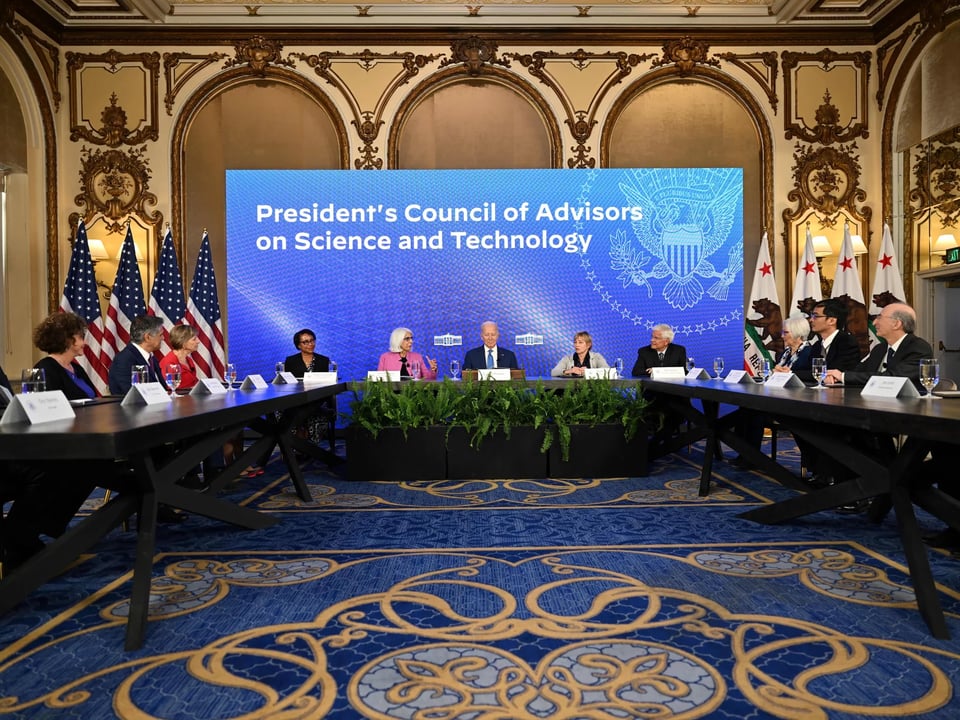
President Biden held a meeting with the President's Council of Advisors on Science and Technology in San Francisco on Sept. 27.
President Biden on Monday will take sweeping executive action to try to establish oversight of the rapidly evolving artificial intelligence sector, setting new standards for safety tests for AI products – as well as a system for federal "pressure tests" of major systems, White House chief of staff Jeff Zients told NPR.
Months in the making, the executive order reflects White House concerns that the technology, left unchecked, could pose significant risks to national security, the economy, public health and privacy. The announcement comes just days ahead of a major global summit on AI taking place in London, which Vice President Harris will attend.
Tech companies currently do their own "red-teaming" of products – subjecting them to tests to find potential problems, like disinformation or racism. The White House has already worked with the major developers on a series of voluntary commitments to red-team their systems by third parties before releasing them.
But Biden's executive order will require the government to set new standards, tools and tests for red-teaming – and will require companies to notify the government and share the red-teaming results for the products that could pose major risks before releasing systems. The power to require companies to do so comes from the Defense Production Act, a Korean-War era law that expands presidential authorities, especially when it comes to national security issues.
"At the end of the day, the companies can't grade their own homework here," Zients said. "So we've set the new standards on how we work with the private sector on AI, and those are standards that we're going to make sure the private companies live up to."
While the Defense Production Act allows for the White House to have some authority over companies' new products, there is still a lack of enforcement power overall — which White House officials say will be up to Congress to legislate. (NPR).
BREAKING: President Biden just announced a HUGE $1.3 billion plan to build brand new power lines in a renewed effort to upgrade America’s aging electric grid. This is another example of how President Biden is leading an infrastructure revolution in our country.
— Biden’s Wins (@BidensWins) October 30, 2023
—————————————————————-
Kamala is always busy.
Happening Now: Join @POTUS and me as we unveil a new Executive Order to advance safe, secure, and trustworthy artificial intelligence. https://t.co/WcTZgTA4Ha
— Vice President Kamala Harris (@VP) October 30, 2023
Harris will attend an AI summit at a UK estate that was a base for World War II codebreakers.

WASHINGTON (AP) — Vice President Kamala Harris will attend a summit on artificial intelligence in the United Kingdom next week, shortly after President Joe Biden issues a highly anticipated executive order on an emerging technology that has generated excitement and fear.
She’s scheduled to leave on Tuesday and return on Nov. 2, and she’ll be accompanied by her husband, Douglas Emhoff, according to her office.
Harris will deliver a speech outlining the Democratic administration’s approach to artificial intelligence on Nov. 1 before attending a summit on the topic the next day. Emhoff is expected to participate in events with civil society groups and young leaders focused on science learning, gender equity and countering hate.
Kirsten Allen, a spokeswoman for Harris, said the goal is a future “where every person is safe from the harms of AI and where every person can share equally in its benefits.”
Governments around the globe are racing to set guidelines for artificial intelligence. Besides Biden’s executive order, the European Union is putting the final touches on a comprehensive set of regulations that targets the riskiest applications for the technology.
U.K. Prime Minister Rishi Sunak hopes to carve out a prominent role for Britain on the issue, and next week’s summit will be held at Bletchley Park, a historic estate north of London that once served as a base for World War II codebreakers. Teams at what’s dubbed the spiritual home of modern computing were able to crack the Nazis’Enigma cipher, helping to end the war.
The summit will focus on the risks from what’s known as frontier artificial intelligence, which is cutting edge systems that can carry out a wide range of tasks and pose unknown risks to public safety. These systems are underpinned by large language models, which are trained on vast pools of text and data.
U.S. and European officials have spoken of working with “like-minded countries” to draw up guardrails for artificial intelligence. China has also been invited to the summit. In a speech on Thursday, Sunak defended the invitation against criticism that China should have been excluded, though he couldn’t say with “100% certainty” that Beijing will attend.
Some lawmakers in Sunak’s Conservative party had called for China’s invitation to be rescinded after the revelation that a parliamentary researcher was arrested on suspicion of spying for Beijing.
“There can be no serious strategy for AI without at least trying to engage all of the world’s leading AI powers,” he said. “That might not have been the easy thing to do, but it was the right thing to do.” ___ (Associated Press).
—————————————————————-
Trump update.
Court arguments begin on blocking Trump from the presidential ballot under the ‘insurrection’ clause.
Could Donald Trump be thrown off the ballot in 2 states? Or more?
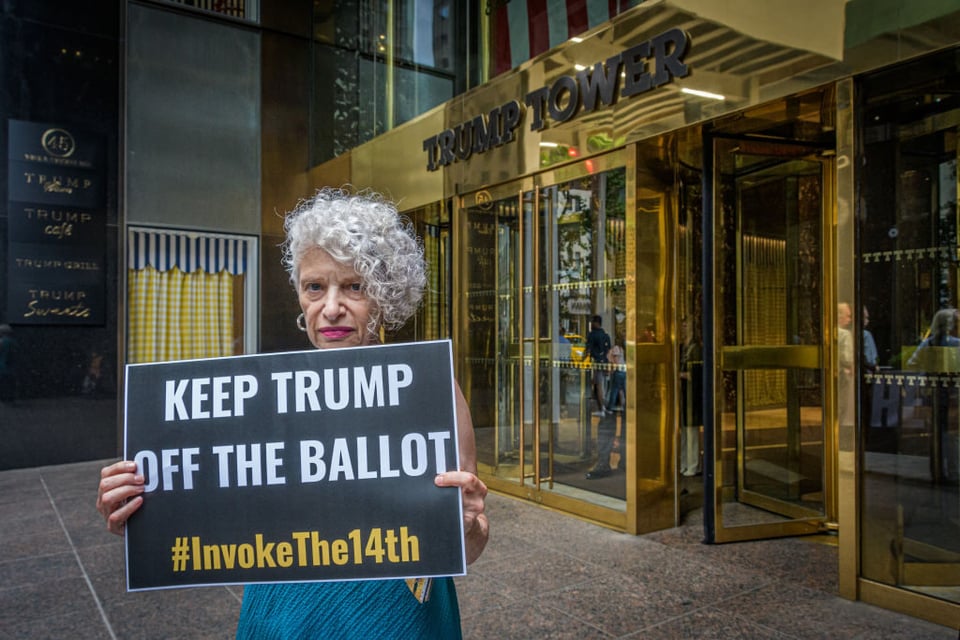
DENVER (AP) — Lawyers for a group of Colorado voters on Monday focused on the January 2021 assault on the U.S. Capitol and former President Donald Trump’s role, opening a trial that could determine whether the Constitution’s insurrection clause bars Trump from running again for the White House.
Attorney Eric Olson recounted Trump’s violent rhetoric preceding the Jan. 6 attack and his encouraging a crowd that came within “40 feet” of the vice president when it stormed the Capitol. He said Trump “summoned and organized the mob.”
“We are here because Trump claims, after all that, that he has the right to be president again,” Olson said. “But our Constitution, the shared charter of our nation, says he cannot do so.”
Trump’s legal team and presidential campaign assailed the lawsuit as little more than an attempt by Democrats to derail his attempt to reclaim his old job. Trump is so far dominating the Republican presidential primary.
Before the trial on the lawsuit began, his lawyers filed a motion to have the judge recuse herself because she had donated in the past to a liberal group in the state. She said no. The campaign also noted the current lawsuit was filed by a liberal nonprofit in a state that voted for Democrat Joe Biden in 2020.
“They send money to these dark money groups — they go to a Democratic jurisdiction and a Democratic judge,” Trump spokesman Jason Miller said.
Monday’s hearing in Colorado state court is the first of two lawsuits that could end up reaching the U.S. Supreme Court. On Thursday, the Minnesota Supreme Court hears oral arguments in a similar case.
Ultimately, either the Colorado or Minnesota case is expected to land at the U.S. Supreme Court, which has never ruled on the Civil War-era provision. Section Three of the 14th Amendment prohibits those who swore an oath to uphold the Constitution and then “engaged in insurrection” against it from holding higher office.
The Colorado testimony began with details about the Jan. 6 assault that was intended to stop Congress from certifying Biden’s election win. Witnesses included some who were there.
Officer Daniel Hodges of Washington’s Metropolitan Police Department recalled being beaten and having someone try to gouge out his eye as he defended the Capitol from the rioters. Footage from the body camera he was wearing that day was shown in court.
“I was afraid for my life and my colleagues,” Hodges said. “I was afraid for the people in the U.S. Capitol building — congressmen, the vice president and what these people would do to them and how it would affect our democracy.”
Democratic Rep. Eric Swalwell testified that members of the House watched the attack on their phones with mounting alarm as they grabbed gas masks and contemplated how to defend themselves. He said they all followed Trump’s messages on Twitter carefully.
“We connected the president’s tweets to our own safety in the chamber and also the integrity of the proceedings,” said Swalwell, who was manager of the House’s impeachment of Trump for the attack and also filed a federal lawsuit against him for inciting the riot.
The trial is unfolding in stages, starting with a description of the attack and Trump’s words and actions, followed by arguments over whether the assault actually constituted an insurrection. Later in the week, lawyers are expected to call constitutional experts to delve into the meaning of the amendment’s insurrection clause.
Trump’s lawyers contend the former president never “engaged in insurrection” and was simply exercising his free speech rights to warn about election results he did not believe were legitimate. They noted cases where the congressional authors of Section Three declined to use it more than a century ago against people who only rhetorically backed the confederacy.
His lawyers said none of the issues are simple in a provision of the Constitution that hasn’t been used in 150 years. In court filings, they said the insurrection clause was never meant to apply to the office of president, which is not mentioned in the text, unlike “Senator or Representative in Congress” and “elector of President and Vice President.”
“This is a legal Hail Mary by the Democrats,” said Mike Davis, an attorney who appeared with representatives of the Trump campaign outside court before the trial began. “This case is going to fail.”
An attorney representing Trump, Scott Gessler, called the lawsuit “anti-democratic” and noted that at least one other presidential candidate — socialist labor organizer Eugene Debs — ran from prison without people trying to disqualify him.
A former Colorado secretary of state, Gessler said there is an informal principle in election law known as “the rule of democracy,” which essentially means to “err on the side of letting people vote” whenever there is an ambiguity.
At the start of Monday’s hearing — held in a large downtown Denver courtroom filled with attorneys, journalists and several armed sheriff’s deputies — the judge rejected the motion by Trump’s attorneys that asked her to step aside because she once contributed money to a liberal group.
Trump’s campaign said it had filed a motion for the judge, Sarah B. Wallace, to recuse herself because she had made a $100 donation in October 2022 to the Colorado Turnout Project, a group whose website says it was formed to “prevent violent insurrections” such as the Jan. 6 attack.
She was appointed to the bench in August of that year by Gov. Jared Polis, a Democrat. Wallace denied the motion, saying she didn’t recall the donation until the motion was filed and has no preconceptions about the legal issues in the case. (Associated Press).
Trump gag order back in effect in federal election interference case
Judge Chutkan’s opinion reinstating Trump’s gag order. 9 pages.👇
https://storage.courtlistener.com/recap/gov.uscourts.dcd.258149/gov.uscourts.dcd.258149.124.0.pdf
One more thing.
On Trumps.
Ivanka Trump will no longer testify this Friday in the New York Attorney General's civil fraud suit against her dad and brothers. Instead, we'll see her 11/8 and potentially 11/9 too. 1/
— Lisa Rubin (@lawofruby) October 30, 2023
—————————————————————-
November 7 is Election Day. Spread the word. Get out the vote.
Here are 4 important states.
Spotlight on Mississippi.
Democrat Brandon Presley seeks big turnout in Nov. 7 bid to unseat Mississippi's Republican governor.
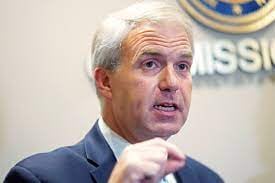
NATCHEZ, Miss. (AP) — At a hotel overlooking the Mississippi River in Natchez, Democratic gubernatorial nominee Brandon Presley told a few dozen Black and white supporters that Mississippi’s Republican governor, Tate Reeves, is trying to hold onto money and power by sowing racial division.
“They’re sitting up in that governor’s mansion tonight, I bet you money, tinkling their little glasses, smoking their cigars,” Presley said, imitating someone holding a tumbler of whiskey. “And they’re talking about how, ‘Well, nobody’s going to come vote.’ And particularly Black Mississippians. They don’t think you’re going to commit.”
That brought murmurs from the crowd. One man called out: “We’re going to be there.”
Presley, the 46-year-old second cousin of rock ‘n’ roll legend Elvis Presley, will need a bipartisan, multiracial coalition to vote in unprecedented numbers to accomplish his goal of unseating Reeves. The state hasn’t wavered as a conservative stronghold in the modern era, and its last Democratic governor was denied a second term 20 years ago.
A former mayor of tiny Nettleton, Presley is wrapping up his fourth term as a state utility regulator for northern Mississippi. Seeking to pull off the improbable in the governor’s race, he has campaigned in all 82 counties — from vote-rich areas in metro Jackson to rural Issaquena County, where fewer than 1,300 people live among cotton and soybean fields in a landmass the size of Los Angeles.
Presley is endorsed by the state’s most powerful Black politician, U.S. Rep. Bennie Thompson. One of the most famous Black Mississippi residents, Oscar-winning actor Morgan Freeman, recently joined him at a campaign event.
Presley has raised more campaign cash than Reeves this year, and he’s attracting larger and more diverse crowds than any Democrat running for Mississippi governor in a generation.
Theresa Hall, a church administrative assistant, attended Presley’s campaign gathering in Natchez and said she plans to make phone calls for him.
“A lot of people think their votes don’t count. But they do,” said Hall, who is Black. “It’s important. If we don’t (vote), we’ll be like we were four years ago, which was disheartening to see.”
Reeves, 49, is seeking a second term as governor after two terms as lieutenant governor and two as state treasurer. During a multi-day trek to fish fries, festivals and businesses in several counties, Reeves spoke to an all-white crowd of about 40 people at a morning gathering at Kountry Kitchen in Columbus, near the Alabama state line.
Republican state Sen. Chuck Younger introduced the governor and warned against voting for Democrats.
“It’s been an honor working with Tate,” Younger said. “If we were to go any other way, it’d be like the old Bruce Springsteen song — one step forward and two steps back. But it wouldn’t be two steps. It’d be about five steps back.”
Reeves said Mississippi has momentum, with a low unemployment rate and improvements in public education.
“Liberal policies don’t work,” Reeves said. “Conservative policies do work.”
Presley is pushing for robust turnout among Black voters, who comprise nearly 40% of the state’s population and are the base of the state Democratic Party. He also needs crossover votes from people who usually support Republicans but are disenchanted with conditions in one of the poorest states in the U.S.
Others are making independent efforts to increase turnout. The Rev. William Barber, national head of the Poor People’s Campaign, recently spoke at churches in coastal Gulfport and Biloxi, encouraging people of all races to support candidates who talk about improving lives of low-wealth residents.
“This election, any election, ought to be about what policies are needed to lift from the bottom,” Barber said.
In speeches and TV ads, Presley talks about being in third grade when his father was murdered and then being raised by a single mom who worked in a garment factory and struggled to pay bills.
Presley says rural hospitals are hurting because of Reeves’ refusal to expand Medicaid to people working jobs with no health insurance — roofing houses or waiting tables at the Waffle House. Reeves calls Medicaid “welfare” and says he does not want more people on government-funded health insurance.
There’s evidence Presley is connecting with white working-class voters.
“Some people I know that are Trump supporters — they have Trump flags flying and a Brandon Presley sign in their yard,” said state Rep. Nick Bain, who lost a Republican primary this year in northeastern Mississippi.
Black voting rights were hard-won in Mississippi, where leaders including Medgar Evers and Vernon Dahmer were killed in the 1960s trying to secure ballot access, which for decades was routinely — and often violently — denied to Black people. An integrated delegation from the Mississippi Freedom Democratic Party, including Fannie Lou Hamer, challenged the seating of an all-white state delegation to the Democratic National Convention in Atlantic City in 1964, drawing attention that helped push the federal Voting Rights Act into law in 1965.
As Black voter registration increased, Black candidates won a significant number of local and legislative offices. No Black candidate has won a statewide election in Mississippi, and it’s gotten harder for white Democrats to win.
Reeves won the four-person governor’s race in 2019 with 52% of the vote to 47% for Democrat Jim Hood, a four-term state attorney general. Reeves links Presley at every opportunity to Democratic President Joe Biden, who is deeply unpopular in Mississippi.
In a November 2018 special election for the U.S. Senate, Democrat Mike Espy tried to build the sort of coalition Presley’s working on now. Espy is a former congressman and was U.S. agriculture secretary. He received 46% of the vote to Republican Sen. Cindy Hyde-Smith’s 54%. Hyde-Smith had been appointed to temporarily fill the seat several months earlier, after longtime Republican Sen. Thad Cochran retired. In a 2020 rematch for a full Senate term, Hyde-Smith defeated Espy by a similar margin.
One source of optimism in the Presley camp is a change in how Mississippi elects its governor. Until this year, winning a governor’s race required overcoming a unique legal challenge that was written into the state constitution during the Jim Crow era and repealed by Mississippi voters in 2020.
Under the old method, a gubernatorial candidate had to win a majority of the statewide popular vote and and prevail in a majority of the 122 state House districts. Without both, the race would be decided by the Mississippi House.
That process was written in 1890, when white politicians across the South were enacting laws to erase Black political power gained during Reconstruction. The separate House vote allowed the white ruling class to have the final say in who holds office, and it fueled lingering cynicism among Black Mississippians about whether their votes would ever matter.
Mississippi was the only state in the U.S. with this process for electing statewide officials, and the vote to repeal the provision came only after former U.S. Attorney General Eric Holder sued the state on behalf of some Black residents.
Winning a governor’s race now requires a majority of the popular vote. If nobody receives that Nov. 7, the race goes to a Nov. 28 runoff. Although an independent candidate, Gwendolyn Gray, recently announced she is dropping out and endorsing Presley, she did so after the ballot had been set.
Presley says the new method of electing a governor gives him a better chance than the old one. He doesn’t have to strategize to win a majority of House districts mostly drawn to favor Republicans.
“For the first time, candidates of all political parties can truthfully emphasize voter turnout, where before it had to be such a scattered approach,” Presley said last week at Tougaloo College, an historically Black school in Jackson. “This will be the first time particularly that Black voters’ votes will count to an extent of 100%, where before, an argument could be made that they were very much diluted.” (Associated Press).
Spotlight on Virginia.
Virginia's legislative contests may be the most important races in 2023 - ABC News
The GOP could gain full control of state government in the bluish commonwealth.
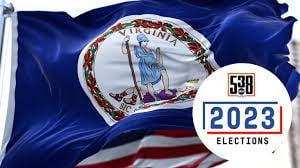
When Virginia Democrats didn’t lose a statewide election from 2012 through 2020, the conventional wisdom shifted toward viewing Virginia as an out-and-out blue state. But in 2021, the Old Dominion reaffirmed its purple bona fides when the GOP narrowly swept all three state offices — governor, lieutenant governor and attorney general — as well as the House of Delegates, the lower chamber of the state’s General Assembly. This left Democrats in control of only the state Senate — which wasn’t on the ballot in 2021 — where their small advantage stood as the main impediment to Republicans’ ability to implement their legislative priorities.
But this November, Republicans could capture the Senate in Virginia’s 2023 legislative midterm elections. If they can also hold onto the House, where they won a 52-to-48 seat majority in 2021, victory in the upper chamber would give them a “trifecta” — control of the governorship and both chambers in the state legislature — for the first time since 2013. GOP victories in Virginia could open the door to conservative initiatives, most notably Republican Gov. Glenn Youngkin’s proposed 15-week abortion ban, which would reverse Virginia’s status as the last Southern state with lesser restrictions on abortion rights.
Looking ahead, Republicans will hope that Youngkin’s strong job approval rating and public concern about issues like education and public safety will boost their fortunes. Yet Democrats still have a decent shot at retaining the Senate, where Democrats hold a 22-to-18 seat advantage, and even winning back the House, despite President Biden’s weak approval rating. This is thanks in part to the electorate’s concerns about abortion, an issue that has troubled Republicans since the U.S. Supreme Court’s 2022 decision to overturn the constitutional right to an abortion in Dobbs v. Jackson Women’s Health Organization.
These state and national forces are also playing out on new legislative maps, which have helped precipitate a huge number of open-seat racesin both chambers via legislators’ retirements and runs for higher office.
What the polls say about the electoral environment
We don’t have a lot of polling to go on, but things look highly competitive. A handful of recent polls asking likely voters in Virginia if they plan to vote for a Democrat or Republican in the upcoming General Assembly election (much like generic ballot surveys for U.S. House of Representatives elections) have found party preferences pretty evenly split.
Virginia voters are sharply split on their preferred party
Generic ballot polls of likely voters for the 2023 state legislative elections in Virginia, since late September 2023
POLL | DATE | DEM. | REP. | MARGIN |
|---|---|---|---|---|
co/efficient/Founders Insight* | Oct. 14-17 | 50 | 50 | EVEN |
Washington Post/Schar School | Oct. 11-16 | 47 | 45 | D+2 |
co/efficient/Founders Insight | Oct. 2-3 | 45 | 44 | D+1 |
Christopher Newport University | Sept. 28-Oct. 11 | 42 | 41 | D+1 |
*The poll required respondents to choose a preference, while other polls had alternative responses such as “other” or refused.
SOURCE: POLLS
Three surveys conducted between late September and mid-October gave Democrats a nominal advantage, but each result was well within each poll’s margin of error. In mid-October, The Washington Post and George Mason University’s Schar School found Democrats up by 2 percentage points, while the Wason Center at Christopher Newport University found Democrats just ahead, but with a larger share of undecided voters. The GOP pollster co/efficient found similar data in its early October survey. Its mid-October survey then found the parties tied at 50 percent, but unlike the other surveys, the pollster compelled respondents who were undecided to pick a side.
These polls also showed how perceptions of Biden might weigh down Democrats. Both the Washington Post/Schar School and Christopher Newport surveys found Biden’s approval rating in the low 40s. The last legislative midterm in 2019 demonstrated why this could matter. That year, Democrats captured the Senate and House of Delegates to gain a trifecta for the first time since 1993, thanks in part to then-President Donald Trump’s moribund standing. They managed this despite the controversy surrounding then-Gov. Ralph Northam, a fellow Democrat, who in early 2019 faced calls to resign after a racist photo from his medical school yearbook surfaced. Here in 2023, though, there is an unpopular Democrat in the White House and a clearly popular GOP governor in Richmond. Recent surveys have placed Youngkin’s job approval in the mid-50s, while Northam’s approval was in the 40sin most polls heading into the 2019 election.
The issues affecting the landscape
Democrats hope that abortion, and fear over the implications of a Republican trifecta for abortion rights in the state, might mitigate damage from Biden’s poor standing. In the Christopher Newport poll, nearly three-fourths of respondents thought Virginia’s current abortion law — which permits abortions up to about 26 weeks into a pregnancy (with certain exceptions beyond that point) — should remain as it is or become less restrictive. As of late September, tracking firm Ad Impact found that more than 40 percent of television ads run by Democratic candidates had highlighted abortion rights, making it far and away Democrats’ most-mentioned issue. Such messaging could strike a chord: The Washington Post/Schar School poll found 60 percent viewed abortion as “very important” to their vote, not far from the 68 percent who said the same of the economy. Similarly, 17 percent in the Christopher Newport poll said abortion was top of mind, second only to the 27 percent who named the economy. More broadly, the Post/Schar poll found that 48 percent thought it would be a “bad thing” if Republicans gained full control of government, compared with 43 percent who said it would be a “good thing.”
Elections in 2022 and 2023 demonstrated that the post-Dobbs landscape may be more advantageous to Democrats. Nationally, voters who somewhat disapproved of Biden broke very slightly for the president’s party instead of the opposition party, a change from past midterms. And in special elections for congressional and state legislative seats in 2023, Democrats have substantially outperformed expectations, on average, compared with the partisan lean of those districts. Among those was a Virginia special election in which now-Sen. Aaron Rouse, a Democrat, flipped a formerly Republican-held state Senate seat in January. That race centered on abortion, too, and Rouse’s victory may have prevented Republicans from having a shot at passing a more restrictive law.
Still, Republicans aim to ride other issues, particularly education, to majority control. That topic has featured most often in Republican ads, along with more traditional GOP messaging issues like public safety and taxes. The focus on education undoubtedly follows Youngkin’s 2021 example, when he centered much of his campaign on parental rights issues that resonated with voters in the wake of COVID-era remote learning, masking policies and controversy over critical race theory. Voters are still thinking about education: 70 percent told the Post/Schar poll education was “very important” to their vote, putting it in the same company as the economy. And while that same survey found that voters were slightly more likely to trust Democrats than Republicans on handling education — 47 percent to 41 percent — there’s been a broader decrease in Democrats’ traditional edge on this issue since the pandemic that the GOP is looking to capitalize on.
Key races and electoral math
Although there’ll be 140 elections on the ballot, most seats are uncompetitive, so a few key contests will decide party control. Synthesizing information from the Virginia Public Access Project, Cnalysis and Elections Daily, the maps below highlight those highly competitive districts to watch in each chamber and how they voted in the 2021 gubernatorial and 2022 U.S. House elections.
In the Senate, Democrats appear to have a slight advantage. Of the chamber’s 40 seats, Democrats are clearly favored in 19 seats versus the GOP’s 16. That means Democrats need to win just two of the five highly competitive races to retain an outright majority, while Republicans need four of the five to get to a 20-20 tie, which would hand them control via Republican Lt. Gov. Winsome Sears’s tiebreaking vote.
Democrats may have a slight edge in the Senate
Outlook for Virginia's Senate races and the margins from the 2021 gubernatorial and 2022 U.S. House elections in each district, as of Oct. 26, 2023
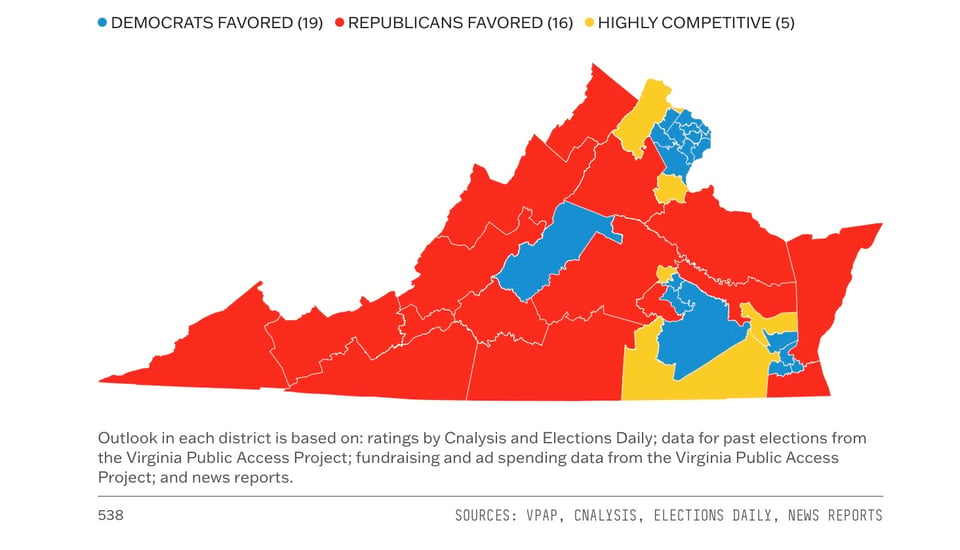
Of these competitive Senate races, three in particular probably hold the key to the next majority because of how expensive they’ve become, and because two involve the most endangered incumbents in the chamber.
In the 16th District in the Richmond suburbs, incumbent Republican Sen. Siobhan Dunnavant faces Democratic Del. Schuyler VanValkenburg in a seat that redistricting shifted from fairly even to Democratic-leaning — Youngkin lost it by 6 points and Democratic congressional candidates carried it by 10 points in 2022. Dunnavant has only narrowly outraised VanValkenburg, but she’s leaned into her background as an OB-GYN doctor to fend off Democratic attacks over abortion.
In the 24th District in southeast Virginia, incumbent Democratic Sen. Monty Mason is battling Republican Danny Diggs, a retired sheriff. Although Mason has outraised Diggs, this seat presents the GOP’s best shot at taking down a Democratic incumbent, as Youngkin carried the district by 3 points and Democrats won by 1 point in 2022. Mason has stressed his support for abortion rights and reducing gun violence, while Diggs has backed Youngkin’s 15-week abortion limit and backed tougher penalties for criminal offenders.
In Northern Virginia’s exurbs, the open 31st District is a seat that Youngkin carried by less than 1 point and Democrats won by almost 6 points in 2022. The contest has turned into an extremely expensive race between Democrat Russet Perry and Republican Juan Pablo Segura. Perry has attacked Segura’s support for Youngkin’s 15-week abortion ban proposal, while Segura has highlighted his support for parental rights in education. Education is an especially salient issue in Loudoun County, where in 2021 the school system’s handling of a sexual assault case involving two students provoked a firestorm.
Control of the House is also very much up in the air. Overall, Democrats appear favored in 48 seats and Republicans in 44, leaving eight highly competitive seats that are most likely to decide the majority.
The House of Delegates looks like a toss-up
Outlook for Virginia's House of Delegates races and the margins from the 2021 gubernatorial and 2022 U.S. House elections in each district, as of Oct. 26, 2023
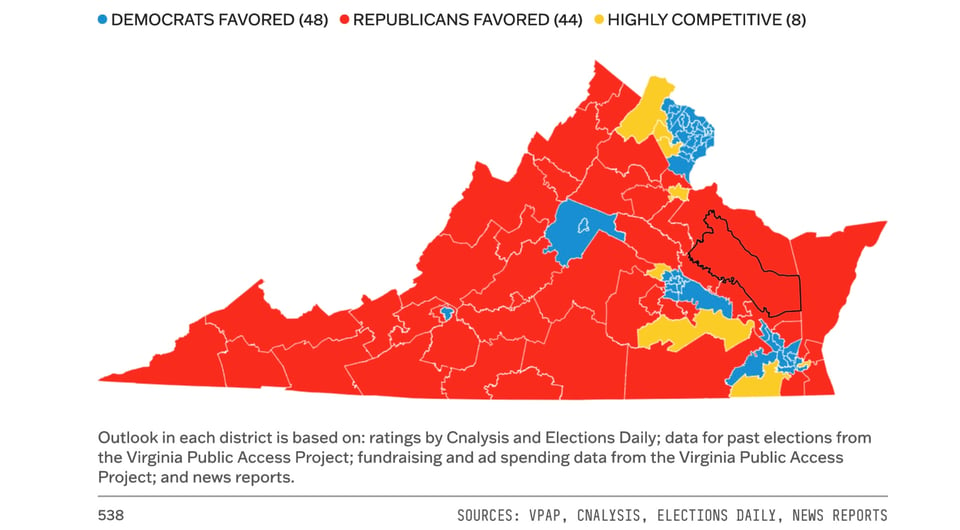
Most of these races are in districts that Youngkin carried in 2021 and House Democratic candidates carried in 2022. And all of them are in suburban or exurban areas of the state’s three major metropolitan areasof Northern Virginia, Richmond and Hampton Roads.
Six of these eight seats are open, while two races include Republican incumbents trying to stay in office. In the 82nd District south of Richmond, GOP Del. Kim Taylor has been neck-and-neck in fundraising with Democrat Kimberly Pope Adams, while in the 97th District in Virginia Beach, Republican Del. Karen Greenhalgh had a sizable war chest edge over Democrat Michael Feggans heading into the final weeks of the campaign.
Meanwhile, the race that’s attracted the most attention is the 57th District in the western Richmond suburbs. There, Republican David Owen might now have an edge in this swing seat after news broke in September that Democrat Susanna Gibson had performed sex acts with her husband in live online videos. While this revelation probably hurt Gibson — Owen outraised her in September after trailing Gibson earlier in the money race — the contest may still be quite competitive. After all, the Republican Party of Virginia raised eyebrows this week when it sent anti-Gibson materials to voters that featured censored screenshots from the videos. Elsewhere, an open seat on the map that might surprise is the 30th District in the exurbs of Northern Virginia, a district that has a GOP lean but where Democrat Rob Banse has substantially outraised Republican Geary Higgins.
Overall, Democrats in competitive Senate and House seats have spent more on ads, according to AdImpact. Yet there’s plenty of money to go around in both chambers. Youngkin’s Spirit of Virginia PAC has shelled out more than $3 million to Republican candidates, and the lingering hope among Republican donors that the governor might mount a late run for president has potentially helped his fundraising efforts for Virginia Republicans. National Democratic-aligned groups like the Democratic Legislative Campaign Committee and the States Projecthave also gotten involved with millions of their own.
Low turnout is a given, but who shows up will matter
One last thing to keep in mind with the 2023 election is turnout. While who shows up always matters, participation in Virginia’s legislative midterms is usually quite low, so a surge in Democratic or Republican turnout could have an outsized impact on the results. In 2019, about 39 percent of Virginia’s voting-eligible population cast a ballot, well below the turnout rate in the 2020 presidential (72 percent), 2021 gubernatorial (52 percent) and 2022 federal midterm (48 percent) elections.
Yet 2019’s turnout was actually far higher than in previous legislative midterms, in line with a broader trend of increased turnout in Trump era elections — as seen in the 2017 gubernatorial, 2018 midterm and 2020 presidential elections. This higher degree of voter engagement has continued into Biden’s term with even higher turnout in the 2021 gubernatorial race and continued high turnout in the 2022 midterms.
As a result, we can probably expect turnout this November to be higher than pre-2019 legislative midterms, although how much higher is harder to say. Considering the high stakes of these elections in deciding whether Republicans will take full control of Virginia’s state government, both parties will be fighting hard, and spending big, to turn out their bases. (ABC News).
In Virginia.
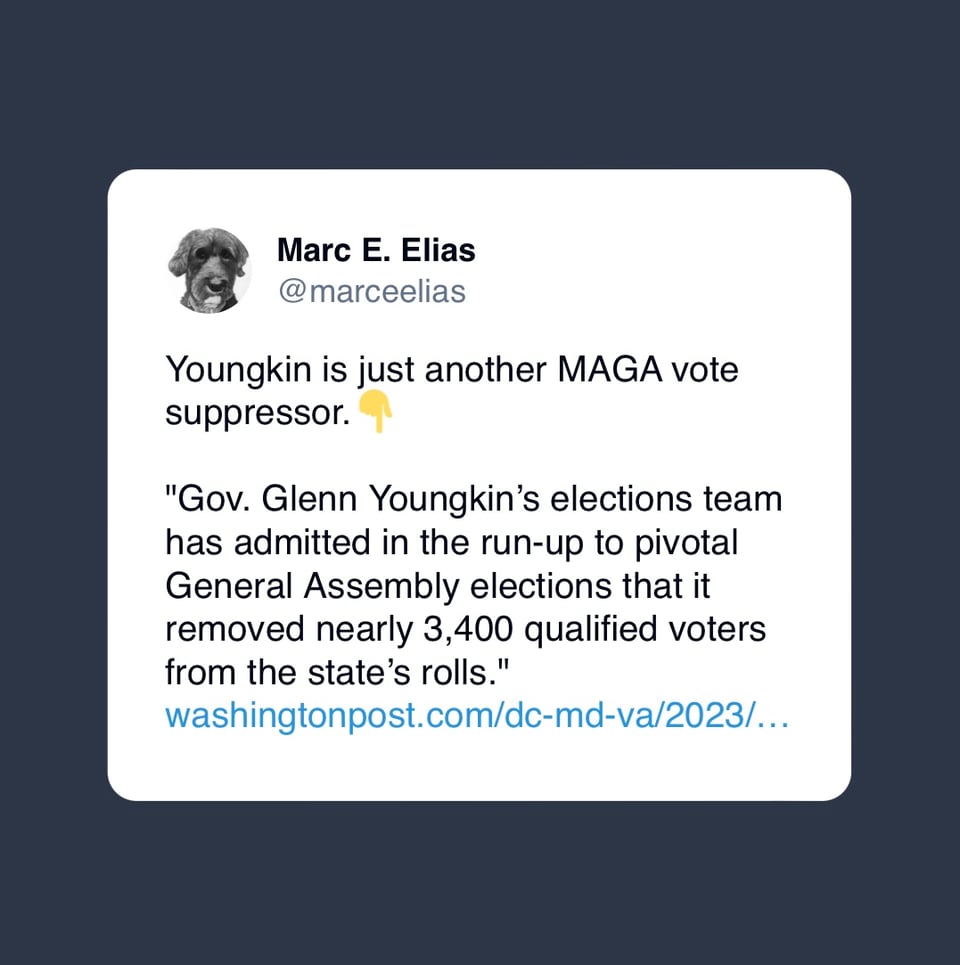
Spotlight on Ohio and Kentucky.
Two more states to keep your eyes on - Ohio, where voters will decide whether to codify abortion rights in the state constitution and Kentucky, where Democratic incumbent Governor Andy Beshear, who won his first race in 2019 by just 5,068 votes, is seeking a second term.
Get out the vote for Mississippi, Virginia, Ohio and Kentucky too.
—————————————————————-
Been waiting for this?
FIFA bans Luis Rubiales of Spain for 3 years for kiss and misconduct at Women's World Cup final.
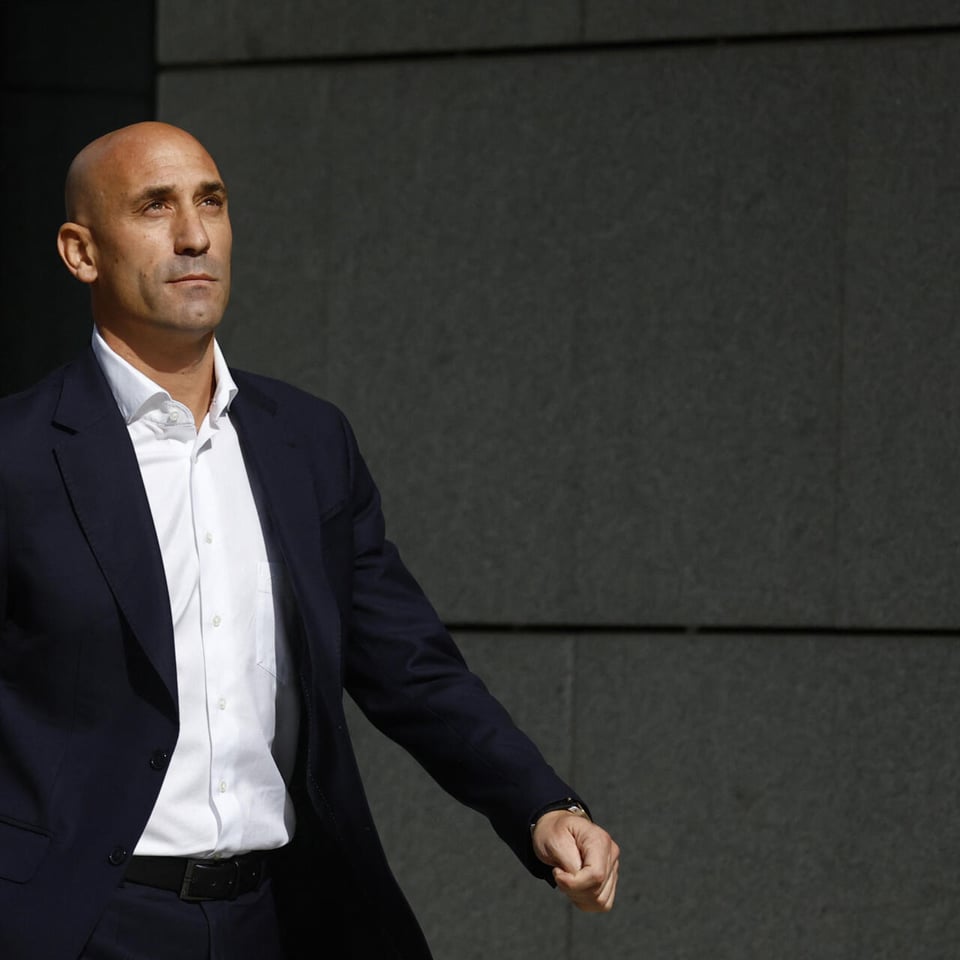
GENEVA (AP) — The Spanish soccer official who provoked a players’ rebellion and reckoning on gender when he kissed an unwilling star player on the lips at the Women’s World Cup final trophy ceremony was banned for three years on Monday by the sport’s global governing body.
Luis Rubiales’ conduct at the Aug. 20 final in Australia — and his defiant refusal to resign as Spanish soccer federation president for three weeks — distracted many people from the women’s career-defining title win.
Rubiales is now barred from working in soccer until after the men’s 2026 World Cup. His ban will expire before the next women’s tournament in 2027.
Spanish authorities have launched a criminal investigation against Rubiales for kissing Jenni Hermoso on the lips after the team’s 1-0 victory over England in Sydney, and his conduct in the fallout from the scandal.
Spanish prosecutors have formally accused Rubiales of sexual assault and coercion. Hermoso said that Rubiales pressured her to speak out in his defense amid the global furor. (Associated Press)
—————————————————————-
Paris Olympics are just around the bend.
Brittney Griner, 5-time Olympian Diana Taurasi head up US national women's roster for November.

Phoenix Mercury guard Diana Taurasi, left, high-fives teammate Brittney Griner during a 2014 WNBA basketball game in Phoenix. Five-time Olympic gold medalist Diana Taurasi and Brittney Griner head up the USA Basketball Women’s National Team roster of 16 players announced Thursday, Oct. 26, 2023, for a pair of November exhibition games and training camp in Atlanta.
COLORADO SPRINGS, Colo. (AP) — Five-time Olympic gold medalist Diana Taurasi and Brittney Griner head up the USA Basketball Women’s National Team roster announced Thursday for a pair of November exhibition games and training camp in Atlanta.
The national team will play the Tennessee Lady Vols on Nov. 5 in Knoxville and Duke on Nov. 12. The team will hold a training camp Nov. 7-9 in Atlanta as the U.S. women chase an eighth straight Olympic gold medal at the 2024 Paris Olympics.
USA Basketball will keep evaluating the player pool before naming the final roster for the Paris Games.
A’ja Wilson, who just led the Las Vegas Aces to the WNBA title, currently has her left wrist in a cast. Breanna Stewart is awaiting the birth of her second child with her wife. Chelsea Gray is recovering from an injured foot, keeping her from a return to her college home at Duke.
Taurasi is one of seven players who will play in both exhibitions along with Griner, Kahleah Copper, Allisha Gray, Rhyne Howard, Sabrina Ionescu and Azurá Stevens. This roster features seven Olympians including two-time gold medalist Griner (2016 and 2021), Angel McCoughtry (2012 and 2016), Ariel Atkins (2021), Gray (2021 in 3-on-3), Kelsey Plum (2021 in 3-on-3) and Jackie Young (2021 in 3-on-3).
—————————————————————-
A man of importance to the American theatre has died.
Robert Brustein, theater critic and pioneer who founded stage programs for Yale and Harvard, dies.
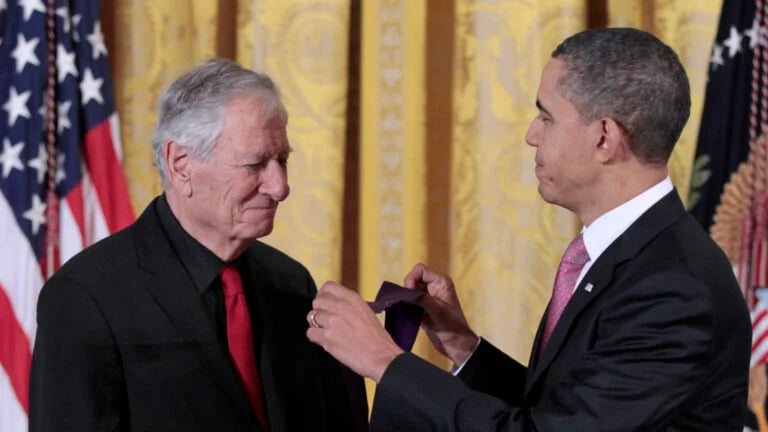
In 2010, Brustein was awarded the Medal of Arts by President Barack Obama at the White House.
NEW YORK (AP) — Robert Brustein, a giant in the theatrical world as critic, playwright, crusader for artistic integrity and founder of two of the leading regional theaters in the country, has died. He was 96.
Brustein died on Sunday at his home in Cambridge, Massachusetts, according to an emailed statement from Gideon Lester, the artistic director and chief executive of the Fisher Center at Bard University and a decades’ long family friend. Lester said he heard the news from Brustein’s his wife, Doreen Beinart.
Known as a passionate and provocative theater advocate who pushed for boundary-breaking works and for classics to be adventurously modernized, Brustein founded both the Yale Repertory Theatre and the American Repertory Theatre at Harvard.
Some of the works he championed upset critics and playgoers unused to nontraditional productions, but he was unapologetic. “I know I’m out of step,” he told The New York Times in 2001. “I’m so out of step I’m almost in step.”
Even in his 80s, Brustein continued offering his opinions on everything from art to politics, lashing out at the Tea Party and describing the pain of breaking ribs on his own blog. He was a distinguished scholar in residence at Suffolk University, a professor of English emeritus at Harvard University and longtime critic at The New Republic.
Born in New York City, Brustein earned a bachelor’s from Amherst and a master’s and Ph.D. from Columbia. A Fulbright scholar, he taught at Cornell, Vassar and Columbia, where he taught drama. He was dean of the Yale School of Drama from 1966-1979 and during that time founded the Yale Repertory Theatre.
Yale Rep, a champion of new work, has produced several Pulitzer Prize winners and nominated finalists. Many of its productions have advanced to Broadway and together have garnered 10 Tony Awards and more than 40 nominations.
“The goal is to try and have people in the audience take away something that lasts and will haunt them, be it either a subject for debate or of their dreams,” he told the Los Angeles Times in 1997. “They’ll have an unresolved experience.”
After a painful, highly publicized dismissal from Yale, Brustein in 1979 switched to Harvard, where he taught English and founded the American Repertory Theatre in 1980. Then in 1987, he founded the Institute for Advanced Theatre Training, a two-year graduate program. He retired as artistic director from A.R.T. in 2002 but continued serving as its founding director.
A.R.T. has grown into one of the country’s most celebrated theaters and the winner of numerous awards, including the Tony Award and the Pulitzer Prize. In 2003, it was named one of the top three regional theaters in the country by Time magazine.
Over the course of his long career as director, playwright, and teacher, Brustein aided the artistic development of such theater artists as Meryl Streep, Christopher Walken, Cherry Jones, Sigourney Weaver, James Naughton, James Lapine, Tony Shalhoub, Linda Lavin, Adam Rapp, William Ivey Long, Steve Zahn, Wendy Wasserstein, David Mamet and Peter Sellars.
At both Yale Rep and A.R.T., Brustein told The Boston Globe in 2012, he embraced popular theater with a nationalistic streak: “We were trying to liberate American theater from its British overseers. We were trying to find an American style for the classics,” he said.
“I was looking for the energies of popular theater applied to traditional work. I was also looking for new American plays. This was a very important function of ours, to encourage and develop new American playwrights.”
Brustein’s own full-length plays include “Demons,” “The Face Life” and “Spring Forward, Fall Back” and “Nobody Dies on Friday,” based on the real-life relationship between Lee Strasberg and his student Marilyn Monroe.
His work has been produced at the Vineyard Playhouse on Martha’s Vineyard, at Theater J in Washington, D.C., and the Abington Theatre in New York. “Playwriting is not so much a craft as an obsession,” he once observed.
His trilogy on the life and work of William Shakespeare includes “The English Channel,” which was nominated for a Pulitzer Prize; “Mortal Terror”; and “The Last Will,” a witty play which takes place inside a tavern on the eve of Shakespeare’s theater career and presents the young poet as an intellectual kleptomaniac. Brustein published his first book on Shakespeare, “The Tainted Muse: Prejudice and Presumption in Shakespeare and His Time,” in 2009.
Brustein was a staunch believer that theater should be first and foremost an art form, not just a political platform. He once criticized the African-American playwright August Wilson for declaring that Black people should not participate in colorblind casting but should form their own separatist companies. The pair then aired their differences in 1997 in a high-profile confrontation at New York’s Town Hall.
Brustein, a tall man with a deep voice, also wrote “Shlemiel the First,” based on the stories of Isaac Bashevis Singer and set to traditional klezmer music. The light, absurd comedy, which gently mocks the lavishness of other musicals, premiered in 1994 at the American Repertory Theatre and was close to making it to Broadway. It was revived in 2011 by Theatre for a New Audience.
“I think the greatest theater is that which combines the low and the high,” he told the Globe. “One thing I can’t stand is the middle.”
His short plays include “Poker Face,” “Chekhov on Ice” and “Airport Hell.” His other books include “Revolution as Theatre,” “Letters to a Young Actor” and multiple volumes of his essays and criticism.
He won multiple honors, including the George Polk Award for Journalism and an award for distinguished service to the arts from the American Academy of Arts and Letters. He was also inducted into the Theatre Hall of Fame. In 2010, he was awarded the Medal of Arts by President Barack Obama at the White House and hailed as “a leading force in the development of theater and theater artists in the United States.”
He is survived by his wife, who ran the human rights film program at the Carr Center for Human Rights Policy at the Kennedy School of Government; and a son, Daniel. His first wife, the actress Norma Brustein, died just after he was let go from Yale.
Brustein was asked in 2012 what he thought of the current state of American theater and said tickets were too expensive and the work often failed to find a deep resonance.
“I love entertainment, but entertainment has got to be a serious effort to investigate the American soul through its theater. Novelists understand this, poets understand this, and for a while the playwrights really understood it,” he told the Globe. “We don’t have that anymore. And if we do, it’s not making it on the stage. (Associated Press).
—————————————————————-
Halloween is here - there - and everywhere.
Especially in NYC.
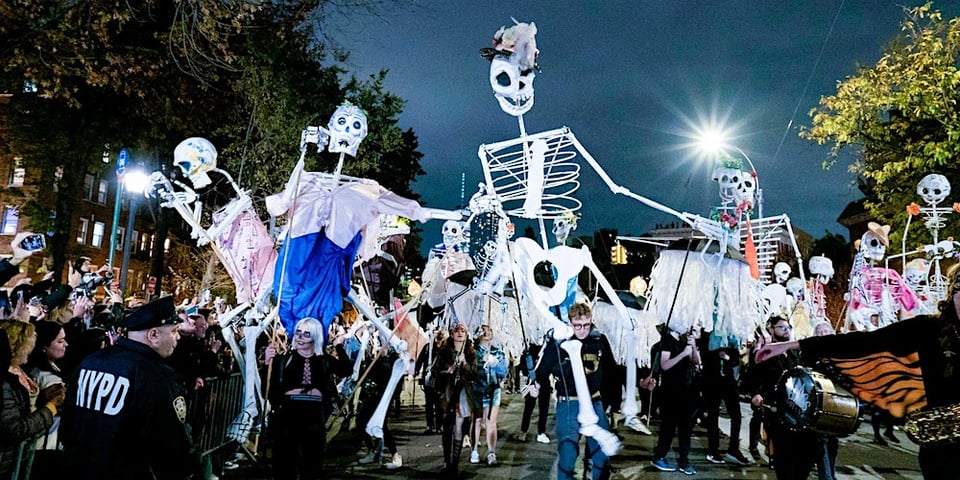
New York’s 50th Annual Village Halloween Parade.
Tuesday, October 31, 2023 at 7 pm.

Have fun.
—————————————————————-